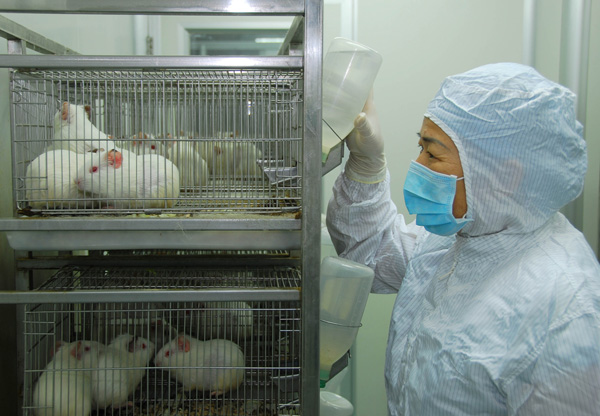Researchers promote ethical experiments
 0 Comment(s)
0 Comment(s) Print
Print E-mail China Daily, May 4, 2015
E-mail China Daily, May 4, 2015
 |
|
A veterinarian feeds mice at a lab operated by the Guangzhou Entry-Exit Inspection and Quarantine Bureau. [Photo/China Daily] |
Transparency needed
One of the key ways of encouraging wider use of the three R's is the promotion of greater transparency about procedures and conditions in labs, according to Clark.
"The public always questions things if they can't see what's going on, and when people can't see what's going on, they will assume the worst. We have to convince scientists that it's worth their while to spend time talking to schoolchildren and public groups and learning how to explain themselves in language the public can understand," she said.
Clark said the UK has a history of animal rights activists raiding labs and damaging equipment. "I think this is the right time for China to do it (implement more humane treatment). Once you have an active animal rights movement, it's very difficult to turn the tide. If you have the luxury of not having a rampant animal rights movement, then it's the time to do it," she said.
"I feel that the Chinese population hasn't been too concerned about animal welfare, historically, but now it's more of an issue," she added.
Zhou, the vet, said the conditions under which lab animals are kept might be particularly poor at some universities where there is little public supervision. "This has become an issue because researchers are initially trained at universities, and if the colleges don't apply the principles correctly, it makes for a flawed beginning for the students," he said.
Moreover, the lack of specialist training, including courses and degrees in the management of lab animals, is another factor hampering change and improvement. "There are no courses on the management of lab animals, not to mention the three R's, in colleges," Zhou said. "If we need such talents, we have to recruit from the veterinarians, but they are trained primarily to treat diseases in livestock," he said.
Bayne is also aware of the problem. "I think there is now recognition in China that veterinarians need specialist training in animal-based research. When they go to vet school, they are trained in the treatment of cats and dogs, mostly, but not the monkeys, mice and rats, rabbits and fish that we use in our research," she said.
"It's about an entire education system. In Western countries, veterinarians who oversee lab animals start their training all the way back in vet school," she said.
Lack of legislation
According to Sun, the Ministry of Science and Technology is currently drafting an amendment to a 1988 regulation on the management of laboratory animals that suggests welfare guidelines, but isn't legally enforceable.
"The regulation is very basic, so it fails to cover issues such as ethics and the welfare of lab animals," he said, adding that there is an urgent need for legislation to guarantee animal welfare and ensure that the three R's are implemented correctly at thousands of laboratories nationwide.
"The decisions the authorities make are based on laws and regulations, so they aren't motivated by issues such as animal welfare, because there are no laws compelling them to do so and, therefore, no legal basis for their decisions."
The lack of legislation also provides local authorities with few incentives to invest in more humane treatment of lab animals. That's because China has no special national research projects to ensure their welfare or the development of alternative testing methods.
The UK's Animals (Scientific Procedures) Act 1986 is widely regarded as the strictest legislation in the world on the protection of animals used in research, and Clark said similarly tough laws would help China.
"Legislation would provide very strong support. I think that China would benefit from enacting tough laws that underpin the ways in which people work," she said.
However, she warned that good enforcement is crucial for success. "To make the legislation really effective, the country would need guidance on how it can be implemented. It's all about how you apply the standards to make them effective in real life," she said.





